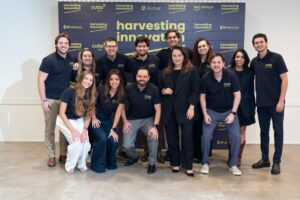Agriculture is the least digitized industry in the world, according to global consultancy McKinsey & Co. Entrepreneurs realize this and in recent years a wave of digital software platforms has hit the market, promising to make farmers’ lives easier.
Some center around making recommendations or even prescriptions for activities such as applying pesticide, water or fertilizer. These recommendations are based on running various types of data — from soil moisture levels to satellite imagery to local weather – through proprietary algorithms and models. Others offer enterprise resource planning tools to help with a farm’s accounting, service provider contracts, and so on. And some want to do all of the above in one place.
While farming is still far less digitized than other industries globally, many venture capital investors and agtech observers think this space is becoming crowded with a lot of companies offering similar products with varying degrees of success on the farm.
John Dombrosky, CEO of AgTech Accelerator told AgFunderNews recently that one of the reasons for this growing number of options is the very low barriers to entry, making some of the options available of very poor quality.
While this happens in lots of industries, Remi Schmaltz, CEO of Alberta-based Decisive Farming, worries too many entrepreneurs with a limited understanding of the industry are innovating in the space.
“Anyone can start a company and build software and hope someone uses it. That’s not specific to ag. But there are a lot of Silicon Valley-type agtech startups now, and I question whether they really understand ag,” he says. “I think there is a lack of understanding of the market and how strong the relationships are for some internal sales teams to to think they will disrupt the industry.”
Decisive Farming has recently closed a $6 million Series A round of fundraising led by McRock Capital with participation from state-run Export Development Canada.
As a fourth generation agribusiness owner, Schmaltz launched the five-year-old company with the purpose of synchronizing the overwhelming number of data sets that farmers typically manage. Combining precision agronomics, crop marketing, and information management services, the company describes its platform as offering farmers increased profitability, sustainability, and ease-of-use.
“I think our main focus as a business has been around providing a complete solution. When I talk about this, I am talking about really integrating all of the service providers, data sources, and different sensors on the farm,” explains Schmaltz. “When I say service providers, I mean grain elevators, retail outlets, agronomists, input suppliers, and equipment dealers.”
Partnering with a venture fund like McRock, which has a specific focus on innovations in IIoT — Industrial IoT — was a no-brainer for Schmaltz.
Its first platform, Optimize RX, combines GIS mapping and soil analysis to assist farmers with seeding and fertilization, optimizing both. Its next product, a cloud-based software app called My Farm Manager, connects multiple service providers to help farmers keep tabs on all their data sets. This platform fully integrates their solutions and is supported by leading ag product and service providers.
Decisive Farming sources data from a variety of places, including satellite imagery and other remote sensors. It also collaborates with original equipment manufacturers (OEMs) to integrate their equipment with Decisive Farming’s platform. Partners include John Deere, and Case New Holland. My Farm Manager also integrates market pricing feeds so that growers can track their margins in near real-time.
“Yes, this is a lot of moving parts and data sets, but the reality is that this is what the farmer manages today. So, for us, this is about making it easier for them,” says Schmaltz.
One way the company is achieving this is through its new Farm Information Report feature. The farmer can obtain a “complete data dump” into a multi-tab spreadsheet that they can then use for a wide variety of purposes, including reporting, insurance, and the like.
“We have farmers that grow for Quaker Oats and one of the big things we heard from them is that they need to satisfy a reporting requirement. They need to know a lot of different things about what happens on their farm. The Farm Information Report provides the bulk of that information for them,” says Schmaltz.
So far this year, venture capital investors have continued to fund decision support software like Decisive Farming’s My Farm Manager app, investing $92 million across 19 deals in H1-2016. But from a competition standpoint, Schwartz sees it on a segment-by-segment level.
“We compete on specific segments of our business. We compete on variable rate technology with a company like Farmers Edge, although we have a different philosophy when it comes to soil testing and creating zone maps,” he says. “We compete with some companies specific to crop marketing and risk management services, and on the farm data management side of things, we compete where people are just providing a platform.”
Ultimately, Schmaltz believes Decisive Farming is the only outlet focusing on linking all of the service providers that farmers use. This, of course, raises the question of why there haven’t been other companies attempting to complete the service provider puzzle.
“People are linear-focused, especially people in precision ag,” explains Schmaltz. “To be able to understand the equipment dealer business, the agronomy, the crop marketing and risk management, the precision farming, how grain companies function—that’s a wide breadth of knowledge of an industry.”
Schmaltz credits key partnerships as being the bridge between these various and disparate segments. The company has partnered with some of the largest ag providers in the game, like Rocky Mountain Equipment and INTL FCStone.
As the CEO of a software-focused, data-driven company, Schmaltz is familiar with many of the open data initiatives that have gained momentum in recent years. He is a proponent of the move toward an open data ecosystem, but a realistic one.
While standardization may help achieve a more open data atmosphere, it’s unrealistic to think that we will ever reach a completely standardized data ecosystem, says Schmaltz.





